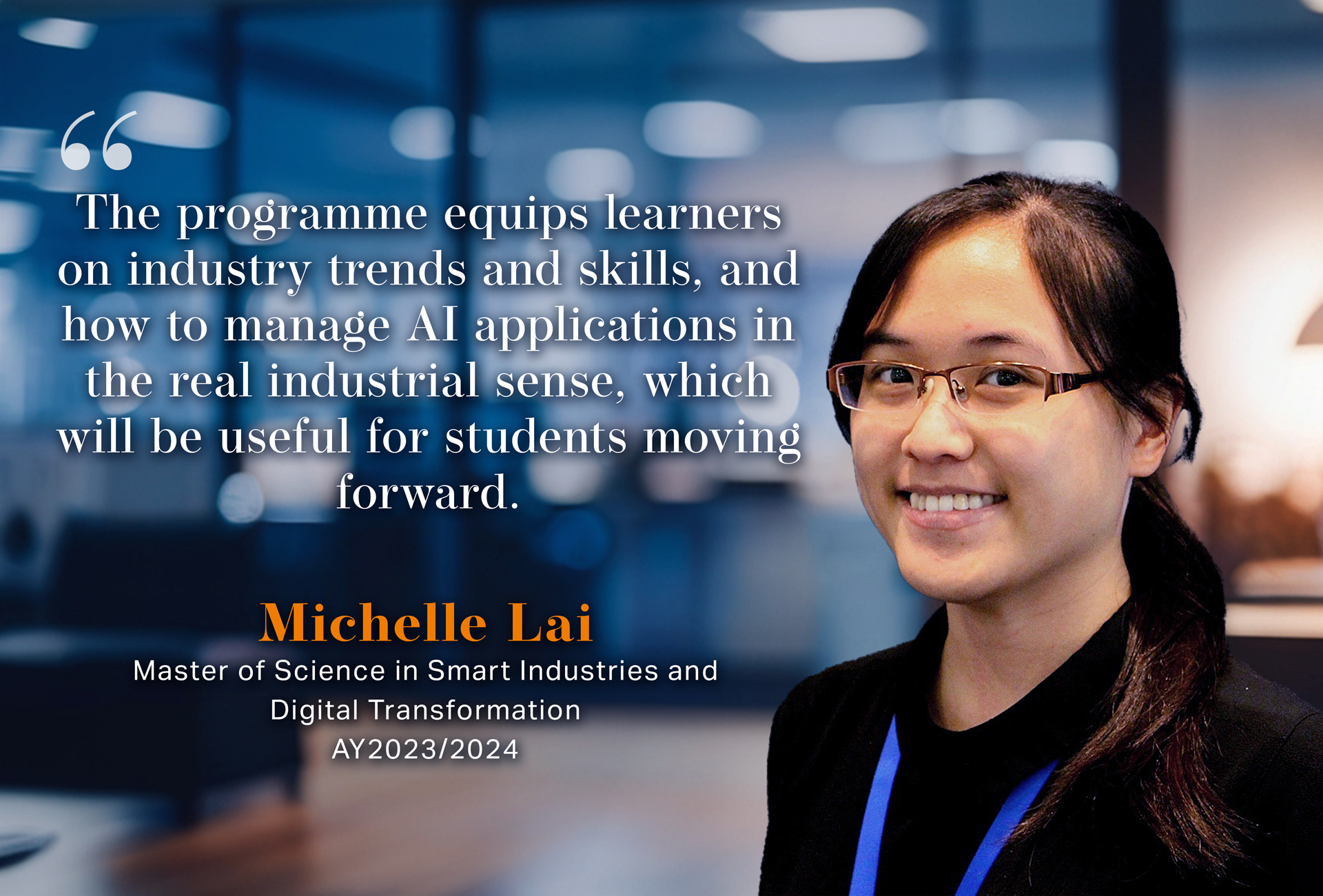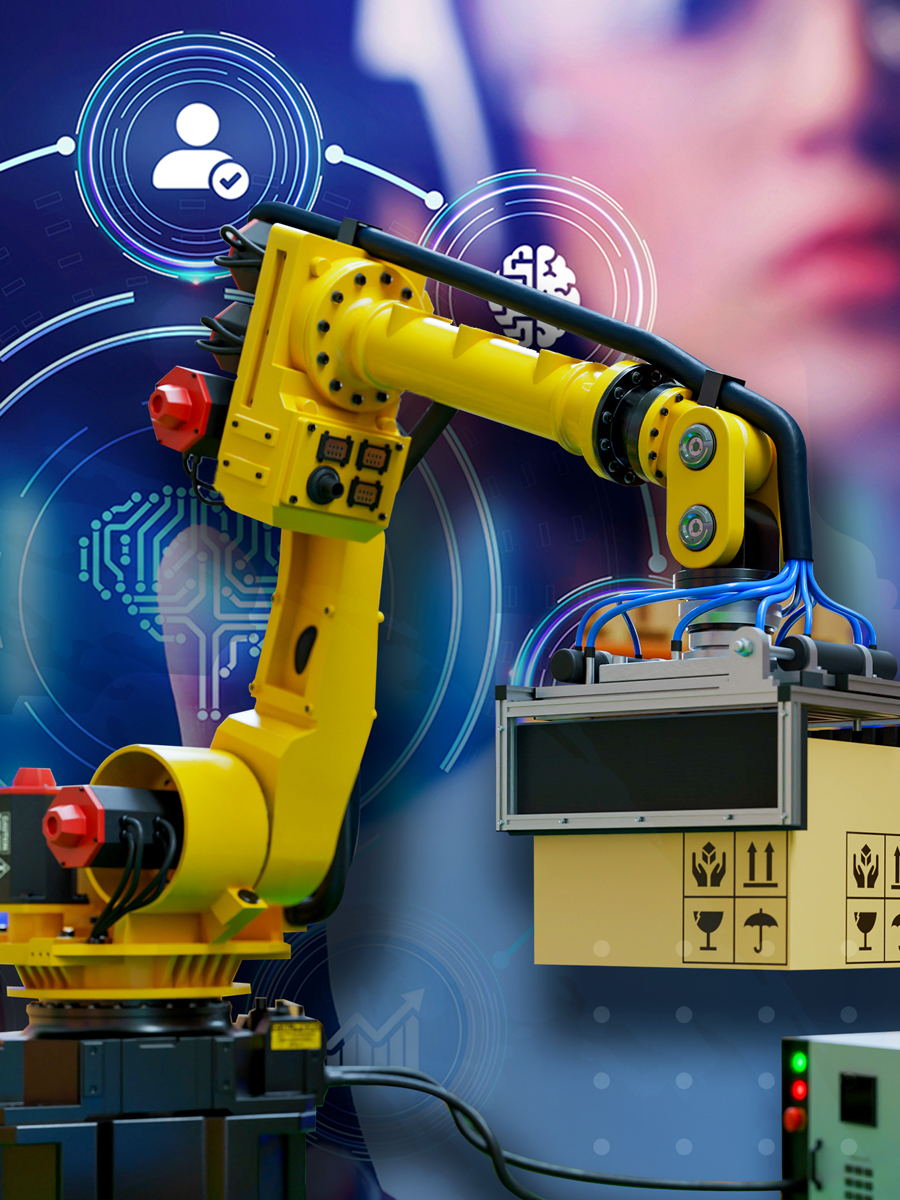As technology continues to reshape the landscape of manufacturing, professionals are faced with a choice — stay within their comfort zone or embrace the future by acquiring new skills.
For Michelle Lai, a seasoned quality engineer with over a decade of experience in the medical device manufacturing industry, the decision to upskill was driven by a desire to remain at the forefront of her industry. To meet her goals, she turned to the National University of Singapore (NUS) Master of Science (MSc) (Smart Industries and Digital Transformation) — a multidisciplinary graduate degree programme (formerly called the MSc (Industry 4.0)) that taps on the expertise of six NUS schools and faculties to equip professionals with the knowledge needed to navigate the complexities of Industry 4.0.
From the Factory Floor to the Digital Frontier
Michelle's career began in the manufacturing sector, where she initially took on roles that involved managing nonconformance, overseeing inspection processes and ensuring compliance with stringent quality standards such as ISO 13485. Her early experiences were foundational, providing her with a deep understanding of the rigorous standards required in the medical device industry. Michelle s role in overseeing quality-related processes showcased her ability to handle complex tasks with precision and care.

As she progressed in her career, Michelle took on more responsibilities, moving into roles that required greater collaboration and leadership. She worked closely with supplier partners to resolve quality issues, improve processes and maintain high standards across production lines. Her expertise in managing product transfers and performing root-cause analyses on production issues made her a key player in ensuring that manufacturing processes ran smoothly and efficiently.
Preparing for Industry 4.0
Despite her success, Michelle recognised that the industry was evolving. The concept of Industry 4.0, which encompasses the digital transformation of manufacturing through the integration of technologies like the Internet of Things (IoT), artificial intelligence (AI) and big data, was becoming increasingly relevant. Michelle realised that to continue excelling in her career, she needed to expand her skills beyond the traditional confines of quality engineering.

“Industry 4.0 was changing the industry, and I was interested to learn more in this area and keep up with the field” Michelle explained. “Looking at the programme outline, I felt that the NUS MSc (Smart Industries and Digital Transformation) programme was quite broad-based and offered many options for learning across different faculties. This breadth of knowledge was exactly what I was looking for.”
A New Chapter in Lifelong Learning
Deciding to enrol in the NUS MSc (Smart Industries and Digital Transformation) programme marked a significant turning point in Michelle s career. The programme s broad-based curriculum provided her with the flexibility to explore areas directly related to her work, while also allowing her to delve into new fields that could enhance her skillsets.
One of the elements of the programme that attracted Michelle was the opportunity to earn a graduate certificate in a specialised area. Given her background in manufacturing, she chose the Graduate Certificate in Digital Supply Chain. On this note, Michelle shared that a standout course she took as part of the MSc programme was Managing the Digital Supply Chain . The course contributed greatly to her professional repertoire as through the classes, she uncovered valuable supply chain concepts, such as how digitalisation has changed the supply chain and influenced market entry and development, and more.
Additionally, Michelle also explored other areas that were outside her usual realm of expertise. She took electives in visual data processing, a field that has offered her new insights into the use of computer vision systems for processing image data. Examples of visual data processing in action would be automated inspection or monitoring of production processes, during the manufacturing cycle. This was a significant departure from her previous work, which had primarily involved numeric data. The ability to apply these new skills to different types of data opened up new possibilities for Michelle, both in her future career opportunities and skillset development.

In addition, Michelle also received a study award during the programme. The Master of Science (Smart Industries and Digital Transformation) Study Awards are offered to exceptional candidates who have performed well in their undergraduate studies and during their admission interviews when applying to the programme. She shares that receiving the award served as an encouragement to put her full effort into the programme.
One of the most valuable aspects of the NUS MSc (Smart Industries and Digital Transformation) programme for Michelle has been the development of technical skills, particularly in programming. While she had some prior experience with Excel VBA, Michelle found the introduction to Python programming course in the first semester particularly beneficial.
Michelle recalled. “Coupled with abundant online resources, the course is great for new students to gain programming skills in the most common programming language used in data, automation, machine learning and AI.”
These skills have proven to be particularly useful in Michelle s current role as a staff quality engineer. The data analytics skills she has acquired through the NUS MSc (Smart Industries and Digital Transformation) programme have enhanced her ability to analyse and solve complex problems, allowing her to contribute more effectively to her team and her company.
Looking ahead, Michelle envisions moving into roles that involve process development or system integration. These are areas where she can leverage both her extensive experience and the new skills she has gained through the MSc programme. “I hope to use the skills I have gained to develop or improve existing processes,” she said.
Advice for the Next Generation of Learners
For those considering the NUS MSc (Smart Industries and Digital Transformation) programme, Michelle offered some encouragement, emphasising the importance of being open to learning new skills, particularly in areas that may seem daunting at first, such as programming.
“I had quite basic knowledge in programming,” she admitted, “but the programme is structured in a way that helps you build a strong foundation. There is nothing to worry about if you are willing to put in the effort.”
Michelle also highlighted the programme s relevance in today s rapidly evolving industrial landscape. With the rise of digitalisation and big data, she expressed confidence that the skills taught in the programme were in high demand across various industries. She said: “These skills are required in almost all industries in one way or another, just in different use cases — and this course provides a broad-based, yet suitably detailed foundation of the skills as a starting point to gain knowledge thereafter.”
Inspired by Michelle s learning journey? For more on the NUS MSc (Smart Industries and Digital Transformation) programme, visit here.